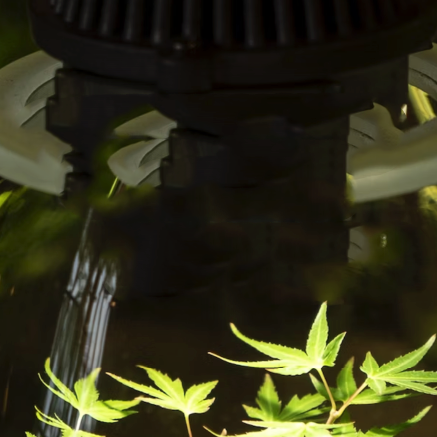Silicon - The Plant Strengthener
Silicon additives, like Shogun Fertilisers Silicon have been around for quite a while now, and the benefits they bring are pretty much indisputable: stronger stems and branches, better resistance to dry conditions, plus better resistance to insects and fungi that must first puncture the surface of the plant in order to feed and take hold. Basically, if you're not using silicon then you should seriously consider trying it as one of the next additions to your grow.
Silicon is naturally found in soil (in small amounts). Although it's not actually an essential nutrient, if plants have access to it, they will use it to strengthen their stiff cell walls and the joins between them. If you take 2 otherwise identical plants and treat them exactly the same but give one of them a silicon additive, after 2-3 weeks the difference between them will be immediately obvious.
How Silicon Affects Plants
The plant that has been fed silicon will look like it has been body-building, with a much thicker main stem and branches. This makes a big contribution toward the end of the grow when the plant has to support it's heavy fruits or flowers. Going down to the microscopic scale, the cell walls will be thicker and stronger, as well as the connections between them. This makes the plant unattractive to pests that bite or pierce the plant in order to feed, because it gives them a really hard job.
Because the cell walls are tougher, it makes the plant more resistant to damage. For most species of plant, apart from the obvious benefit of being more resistant to damage, a fantastic side-effect of this is that unwanted fungal infections find it much more difficult to take hold. Botrytis (aka the dreaded grey mould) most often gets into a plant via a damaged part. Plants without any damage are difficult for botrytis to infect. Likewise powdery mildew.
Plants treated with silicon transpire less and can uptake and use water much more efficiently too. This gives them a higher survival rate in drought conditions (not that anyone ever forgets to water their plants, of course...).
Silicon also assists with the uptake of certain nutrients, most notably zinc, calcium and nitrogen in soil.
And There's More....
With all those benefits, you're probably wondering why anyone would grow without it. But we still haven't got to end of the list yet! In fact I have left probably the best bonus until last. That is that silicon increases the rate of photosynthesis.
Yes, that's right. Silicon actually stimulates greater chlorophyll production, and chlorophyll is the compound in the plant that conducts the photosynthesis. More chlorophyll means more photosynthesis. The higher the rate of photosynthesis creates more sugar. The greater amount of produced sugar then powers more growth and improves the quality and numbers of fruits and flowers.
So, are there any drawbacks? Well, there's just one small inconvenience. Silicon needs to be added to your feed water in a specific way in order to avoid causing precipitation (cloudy water) when you add your main nutrient.
How To Use A Silicon Additive
The correct way to do make up your feed water / nutrient solution is as follows:
1) Use reverse osmosis water or tap water that has been allowed to stand for several hours to allow the chlorine to evaporate off. Alternatively, use a bit of Ecothrive Neutralise to convert the chlorine into harmless by-products. Getting rid of the chlorine is particularly important if you grow organically, or make use of beneficial bacteria and fungi. If you decide to let it evaporate by standing then if you bubble air through it (via air pump and airstone) will help to keep it oxygenated fully.
2) Mix in your silicon additive at the recommended dosage for that product. The pH will usually go up. There are some exceptions to this - Rhino Skin by Advanced Nutrients, Aptus Regulator and Buddhas Tree Solar Green Power do not raise pH. Make sure the silicon additive is thoroughly mixed in before going any further.
4) Next, add your nutrient and any other boosters.
5) Using your pH pen and pH Down product, adjust the pH to the correct level for the type of grow you do. (pH 5.5 - 5.8 for hydroponics). This step may not be required if you grow in soil.
If step 3) is not followed then your nutrient solution may go cloudy indicating that precipitation has occurred, making the silicon unavailable to the plant.
Shown at the top of this page.
Advanced Nutrients Rhino Skin has the added benefit of not affecting pH much. Plus it fits in with the Advanced Nutrients pH perfect range.
